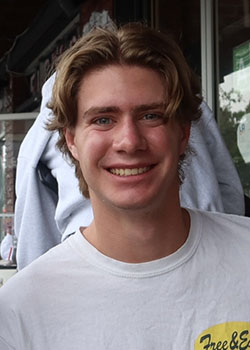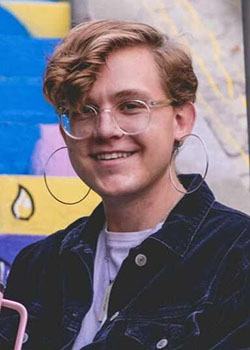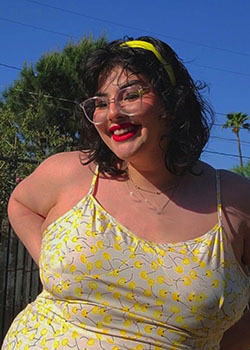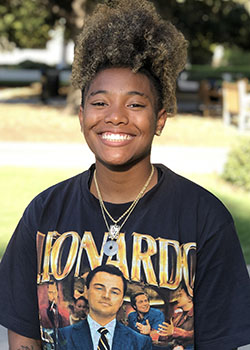Meet some of our Critical Theory & Social Justice (CTSJ) majors.

Andrea Ibarra
Hometown: Altadena, CA
Majors: CTSJ, politics
What do you find most compelling about studying CTSJ?
I’m compelled by the use of theory as a framework to understand the relationship between social structures and political ideology, and how the concept of race and ethnicity is used to analyze the way systemic racism and other structural injustices have been maintained for generations. There are no limitations in the major, as you're able to take a variety of courses that allow you to understand the structure of our society through an interdisciplinary approach. The department is infused with knowledgeable, compassionate and dedicated professors who create their classes around developing your critical thinking while applying your understanding to historical and modern issues.
What was your motivation to major in CTSJ?
Going into Oxy, I knew I wanted to pursue a career in law, but I wasn't sure what major would ultimately make me a strong candidate for law school. I was introduced to CTSJ Profs. Christianakis and MacManus the summer before my first year through the Multicultural Summer Institute (MSI). Being taught by these professors along with Prof. Mora gave me a deeper understanding of what I was looking for in professors and, ultimately, my education at Oxy. Since my first meeting with my now-adviser Prof. Christianakis, I knew CTSJ would be the major to not only prepare me to prosper academically, but to grow as a critical thinker going into the legal field. My Critical Race Theory class was my introduction to understanding how historical racial subordination continues to affect our social and institutional structures and requires an intersectional lens. The immense support from professors within and outside the classroom has created a platform for me to continuously strive as a student and overall individual by challenging myself to go beyond my reach.
The immense support from professors within and outside the classroom has created a platform for me to continuously strive as a student and overall individual by challenging myself to go beyond my reach.
What are your ambitions post-Oxy and how has the liberal arts approach helped to put you on this path?
After graduating from Oxy, I plan to attend law school to obtain my JD and practice law in California as a civil rights attorney. My background as the daughter of immigrants compelled me to dedicate my life to serve and uplift marginalized voices while advocating for systemic change. After practicing civil rights law, I would like to transition to international civil rights law to combat systemic issues through an international approach. The liberal arts approach has deepened my commitment to social justice transnationally by applying an intersectional lens to the law and its effects on marginalized groups. Participating in a wide range of courses with professors from various backgrounds and approaches have broadened my intellectual curiosity about the law. Broadening my learning through an interdisciplinary lens has been essential to my advocacy efforts within the legal profession and community mobilization that I will carry with me throughout law school and beyond.
The liberal arts approach has deepened my commitment to social justice by applying an intersectional lens to the law and its effects on marginalized groups.
Have you taken part in any student research opportunities through Oxy?
In the second semester of my first year, I had the opportunity to visit Mexico City during my spring break through the ASP Research Travel Grant. Inspired by my Critical Race Theory class and my time interning at the Coalition for Humane Immigrant Rights in the Family Unity Legal Department, I became interested in developing research on the effects of gender-based violence against migrant women. Through the support of Prof. MacManus as my mentor and Karla Hernández, manager of the Undergraduate Research Center (URC), I narrowed my focus on gender-based violence to migrant women in the context of Mexico as a border country to the United States. During my time in Mexico City, I collaborated with the Instituto para las Mujeres en la Migración, a Mexican NGO advocating for the rights of women in migration. This experience has been invaluable to my growth as I gained valuable insights into Mexico’s legal system and the intersecting struggles women endure during their migration journey. The continuous support from my professors and mentors has enabled me to continue my research as it is crucial to pursue tangible solutions for addressing these systemic inequalities.

Levi Lee
Hometown: Hong Kong
Majors: CTSJ, Japanese Studies minors: linguistics, history
What was your motivation to major in CTSJ?
Originally I couldn’t decide between a variety of majors. After taking Prof. Moazzam-Doulat’s Postcolonialism class, I felt CTSJ was a great blend of my interests and carried a lot of potential for me to explore how I can make an impact with my learning.
Can you describe your working relationships with CTSJ professors? Are there any standout classes you’ve taken?
I’ve taken classes with Prof. Moazzam-Doulat and Prof. Christianakis. They’re both fantastic, Prof. M. is my official adviser but while I was taking the Mother Goose class with Prof. C., she also took on that role. They’re definitely fantastic mentors who you can really learn from! If I had to describe the working relationship I’d say it’s a blend between a mentor and a parent. I say like a parent because there’s the vibe of supportiveness that is associated with family. I think Mother Goose and What Comes After Postcolonialism were my favorite courses at Oxy in general. The CTSJ Research Journal is also one of the highlights of the department! It’s a fantastic way to explore how CTSJ concepts apply in real-world scenarios and other academic settings.
The liberal arts approach allowed me to explore many areas of interest, not only to see how they intersect but also how they function outside of academia.
Did you study abroad? How did it complement or enhance your education?
Studying abroad in Japan helped me apply all these concepts I’ve learned to new contexts I may not have been exposed to at Oxy. Interacting with people who don’t know what CTSJ is and seeing how the major’s classes overlap with multiple other majors was very enlightening. I’m in Japan now and can see how concepts and approaches I’ve learned in CTSJ classes have transferred to psychology, history, international relations, and politics classes.
What are your ambitions post-Oxy and how has the liberal arts approach helped to put you on this path?
After graduating, I plan to pursue further education, ideally a Ph.D., in conjunction with a craft apprenticeship in order to become a museum curator. The liberal arts approach allowed me to explore many areas of interest, not only to see how they intersect but also how they function outside of academia. In particular, seeing the dependency between the preservation of art and knowledge in furthering quality of life and economic development pushed me toward the maintenance of cultural arts as a career. Given the current political climate as well, I felt there was a significance to maintaining our museums and places of knowledge.
The department is really welcoming and you really sense the support from both professors and peers. It helped me feel more comfortable asking questions and expressing myself.
What is the vibe of the CTSJ department?
CTSJ is one of the most chill departments at Oxy. I was initially intimidated by the social justice aspect of the department because I did not enjoy being at the frontlines of protests or public facing events. The department is very supportive of many methods of enacting social change including ones that aren’t as front-facing. I feel the department is really welcoming and you really sense the support from both professors and peers. It helped me feel more comfortable asking questions and expressing myself.

Nataly Mesinas
Hometown: Las Vegas, NV
Major: CTSJ minors: LLAS, Food Studies
What was your motivation to major in CTSJ?
I chose to major in CTSJ because it gave me a way to build on my interests in justice and identity while learning alongside people who are just as passionate. It’s one of the few subjects that makes me genuinely excited to go to class and do the readings, because the conversations we have feel real and connected to everyday life. CTSJ has changed the way I see things—it’s made me more aware, curious, and grounded in why I care about justice.
Have you taken part in any student research opportunities through Oxy?
This summer, I was selected for the Humanities for Just Communities (HJC) program, where I worked in Prof. Grossman’s cohort. Inspired by her research on narrating the carceral system, I developed my own project titled Crimmigration and Carceral Power: The Reality of Immigration Detention and Its Intersection with Mass Incarceration. My research centered personal narratives to highlight the human experiences behind immigration detention and its connection to mass incarceration. This topic is deeply important to me because it affects real people and communities that are often silenced or dehumanized. This project holds deep personal and academic significance for me, as it engages with the urgent need to recognize how immigration and incarceration systems overlap in producing harm. It was such a meaningful and eye-opening experience, not only because of the research itself, but because of the community I built. I loved getting closer with my cohort, going on field trips, meeting guest speakers, and learning from professors who care deeply about justice work. My final project turned into a full undergraduate course syllabus that Prof. Grossman plans to use in the near future. I wanted to create something that could live beyond just a paper, something that helps students think critically about incarceration, immigration, and power dynamics, which reflects my belief that the classroom can be a powerful outlet for change.
I wanted to create something that could live beyond just a paper...My final research project turned into a full undergraduate course syllabus that Prof. Grossman plans to use in the future.
Can you describe your working relationships with CTSJ professors? Are there any standout classes you’ve taken?
One of the things I love most about being a CTSJ major is how genuine and caring the professors are. Decolonizing Education with Prof. Macal has been one of the most meaningful classes I’ve taken at Oxy. It wasn’t just about learning theories but about unlearning and reimagining what education could look like when it’s rooted in care, collaboration, and lived experience. Prof. Macal creates a space where you can show up fully as yourself and connect what you learn in class to the world around you. Professors like Macal and Christianakis truly embody what makes CTSJ so special. They’re not only brilliant professors but also people who take the time to know you as a person, not just a student. They ask how you’re doing, remember what you’re passionate about, and encourage you to bring your full self into your work. Having professors who genuinely care made me realize that meaningful change starts in spaces built on trust, care, and accountability, values many CTSJ professors practice every day.

Warren Cruser
Hometown: Kalama, WA
Major: CTSJ minors: politics, German Studies
Can you describe your working relationships with CTSJ professors? Are there any standout classes you’ve taken?
The CSJ professors not only initially motivated me to join the program but have also provided me with some of the most interesting courses I have taken at Oxy. I have enjoyed taking legal studies classes with Oxy's pre-law advisor, Prof. Léon, who also works as a civil rights attorney with the California Department of Justice. These classes have helped motivate me to explore law school as a possibility for myself post-graduation. My favorite class that I have taken at Oxy was a memory studies class with Prof. Ratskoff. In this class we explored themes such as collective memory during the Holocaust and how communities remember and commemorate trauma. The wide scope that falls into the CTSJ department attracts professors from numerous different backgrounds and educations, giving those who study in the department no shortage of engaging and thought-provoking courses.
Did you study abroad? How did it complement your education?
I studied abroad in Berlin, Germany, last fall. It was an unforgettable experience which greatly complimented my studies in CTSJ. Studying in Berlin allowed me to observe countless museums and memorials, furthering my education in memory studies. Going to Berlin was first suggested by my advisor, Prof. Moazzam-Doulat, who encouraged me to take advantage of studying abroad as a CTSJ major. I would encourage anyone in this major to go abroad as well because of just how applicable CTSJ is to the whole world. Living in a whole new place and experiencing a different culture has helped me contextualize my studies and inspire further areas for research as I enter my senior year.
The chance to personally interact and get to know my professors helped me gain confidence in my abilities as a student while also helping me find the resources to prepare for post-undergraduate life.
What do you find most compelling about studying CTSJ?
The applicability of Critical Theory and Social Justice to all aspects of life gives me endless opportunities to learn and study. I view many other majors as studies that build off the class before, and prepare you for the next one. You take a certain class that will make a class you will take in a year much easier, and that is an appealing form of study. However, I view CTSJ as a major that expands outward from itself in all different directions. You can find an endless amount of topics and case studies that could make a good class in the program, and they are all tied together through the same critical theory lenses at the heart of the program. I have taken classes on law, memory studies, LGBTQ+ lives in the Middle East, and many more. The endless possibilities is my favorite part of being a CTSJ major.
What are your ambitions post-Oxy and how has the liberal arts approach helped to put you on this path?
After Oxy I intend to apply to law school. Classes with Prof. Léon and the rest of the CTSJ department have motivated me to study the law and pursue a career in that field. I don’t believe I’d be confident in this decision if it weren't for the liberal arts approach in my undergrad education. Interacting with my professors helped me find the things that inspired me, and made my choice of major incredibly easy. The chance to personally interact and get to know my professors helped me gain confidence in my abilities as a student while also helping me find the resources to prepare for post-undergraduate life. I would encourage anyone who wants an interactive and engaging education to pursue the liberal arts.
To see more Meet Our Majors profiles, visit the main page.




